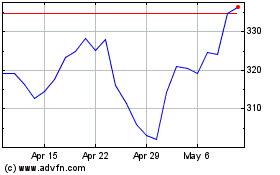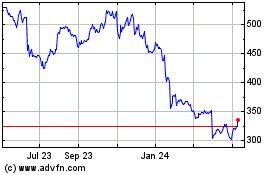Why Would Walmart Want to Buy an Insurer? The Retail Squeeze
March 30 2018 - 7:58AM
Dow Jones News
By Sarah Nassauer and Anna Wilde Mathews
First Walmart Inc. dropped "stores" from its legal name. Now the
retail giant, faced with shrinking profits and in search of growth,
is exploring an acquisition that would push far beyond its big box
roots.
On Thursday, The Wall Street Journal reported the world's
biggest retailer is in preliminary discussions to buy U.S. health
insurer Humana Inc., according to people familiar with the
situation. The companies are discussing various options, one person
said, and there is no guarantee they will agree on a merger or
pursue some other partnership.
Walmart's revenue eclipsed $500 billion in its latest fiscal
year -- more than Apple Inc. and Exxon Mobil Corp. combined. But
Walmart's profits have declined 30% over three years to $10.5
billion, squeezed by competition and e-commerce investments to fend
off Amazon.com Inc.
"The company is of such scale that the opportunities for future
expansion in the U.S. are limited," said Neil Saunders, managing
director of GlobalData Retail, a consulting firm. "Moving onto this
turf would give Walmart a whole new arena in which to expand," at a
time when retail margins are under pressure, he said.
Still "the risks of becoming entangled in the complex U.S.
health-care industry are considerable," Mr. Saunders added.
Taking over a health insurer would put the retailer into a
complicated and highly regulated business. Humana's business is
particularly tied to the government because it focuses on Medicare
coverage, at a time when health care is a political flashpoint.
Humana, however, has withdrawn from the Affordable Care Act's
exchanges, after suffering losses, and the private Medicare plans
it offers, known as Medicare Advantage, have recently been
protected by both Republicans and Democrats.
A Humana deal would also be a hefty expense for Walmart. Humana
has a market value of $37 billion and a buyer would need to pay a
premium. Walmart's largest acquisition to date came in 1999 when it
bought U.K.'s Asda Group PLC for $10.8 billion. Walmart ended its
fiscal year with less than $7 billion in cash on hand.
In recent years, Walmart has expanded the pharmacy and health
services it offers in stores, adding cheaper generic drugs for
sale, procedures like vaccinations and urgent-care locations. It is
part of an effort to give shoppers another reason to visit
Walmart's cavernous locations even as they buy more online.
Walmart is also the largest seller of food in the U.S., putting
it in a unique position to capitalize on shopper data or use a
health insurer's data to inform decisions on what products to carry
in stores. The average age of a Walmart shopper is 50, according to
Kantar Consulting, and it has gotten older over the last five years
in line with the broader U.S. shopper population.
"If I can get you in for your health care and your meds... then
you are hopefully going to buy some blue jeans and laundry
detergent," said Steve Barr, consumer markets leader at PwC.
Walmart and Humana have already partnered for over 10 years on a
popular Medicare drug plan that lets customers fill prescriptions
at Walmart pharmacies with low co-pays.
"They've proven these two companies can work together in a
retail setting," said John Gorman, chairman of Gorman Health Group,
a consulting firm focused on government health programs. A merged
Walmart-Humana could create a Medicare plan that could be sold in
Walmart stores and tap into Walmart's other potential health
offerings.
In addition, he said, Walmart's heft as a major purchaser of
goods including drugs might be able to generate savings for Humana
and its members. Humana already owns its own pharmacy-benefit
manager, but it is smaller than the giants in that business, such
as CVS Health Corp. and Express Scripts Holding Co., and has less
leverage with pharmaceutical companies. Express Scripts has agreed
to be bought by insurer Cigna Corp., while CVS aims to take over
Aetna Inc.
For Humana, joining Walmart could also bring chances to reach
consumers more closely, track them through richer data, and bring
down the cost of care by moving some services into a cheaper
setting. Humana has already been forging more deeply into health
care as a way to manage its members. It is working closely with
doctor groups and plans to buy a stake in a home-health and hospice
operator.
But Walmart's stores aren't as ubiquitous as CVS, said Sarah
James, an analyst with Piper Jaffray. "It's not going to give them
the same footprint as CVS," she said, as the stores aren't as
integrated into neighborhoods as the smaller drugstores. That may
limit Walmart's ability to be a convenient touchpoint for consumers
with routine health questions or needs, she said.
Write to Sarah Nassauer at sarah.nassauer@wsj.com and Anna Wilde
Mathews at anna.mathews@wsj.com
(END) Dow Jones Newswires
March 30, 2018 08:43 ET (12:43 GMT)
Copyright (c) 2018 Dow Jones & Company, Inc.
Humana (NYSE:HUM)
Historical Stock Chart
From Jun 2024 to Jul 2024

Humana (NYSE:HUM)
Historical Stock Chart
From Jul 2023 to Jul 2024
